“Nothing. I was just dropping by. .”
“But. .”
“But nothing…”
She opened the door all the way and he stepped in. He sat in the living room as she disappeared for a while and came back with a glass of tea. She settled down in a blue armchair across from him and Mahmud made conversation. He told her about the corpse that the “boys” had stumbled across in front of the clothing boutique down in the souqs — they figured it was an impatient thief who’d headed for the stores before the area had been secured.
Looking him in the eye, the woman bemoans the looting and the looters. Then, with her eyes still fixed on him, she falls silent, sips her tea, and clears her throat.
Mahmud doesn’t quite know how to move closer. He feels that he’s on fire, everything inside him is ablaze. He tries putting his arm around her but she won’t let him.
“No,” she says, “I have children, shame on you.”
But from the tone of her voice and the glimmer in her eye, Mahmud senses that she too wants him. So he moves a little closer, and then, he takes her. He takes all of her, just like that. And oh, how different she feels! It’s been so long since Mahmud tasted a “different” sort of woman. She isn’t exactly pretty, he thinks, as he watches her undress and cup her hands to her brown, slightly rounded shoulders, but she is something else. . she moans and she screams, she says things and takes all of him, she kisses his neck and writhes with pleasure, this way and that way. . as he lowers himself into her, he can hear her panting breaths, and feel the shiver in her body, as if she hasn’t slept with a man for a hundred years. Making love to her, he feels as if he’s known her forever, and he wants to cry; he feels a sob rising in his throat but it remains stifled, only the tears flow down his cheeks. Later, silently, he just listens to her moaning as she melts under his touch, like a piece of dough he is kneading, and wraps her body around his as he lies back in bed, smoking; then he rests his head against her belly, and listens to her telling him about the trouble with the children and her fear of living on this street.
And I, too, am afraid, he thinks, realizing now that he daren’t go with the shabab anymore because he’s really afraid. But he says nothing. He listens to her, cradles her under him and takes her once more, while she surrenders and quivers with pleasure. Oh, what a woman, a woman who quivers! Mahmud wants to tell her about little Fatimah, how he used to watch her going down the stairs and call out mashallah after her, and how she has changed… she’s like a stone in his arms now and he no longer desires her. . how he still loves her, and loves Ali and, even though Ali’s dead, he is still Abu Ali, even though Ali did himself in and seared everybody’s heart.
But he says nothing. He just lets his body plunge into that warmth, into that wetness that fills every crevice, like the water from the spring over there, in the distant village. And then she tells him that’s where she’s from too.
“I’m a servant, born a servant and I’ll die a servant.”
She gets up — no, she isn’t pretty, but she is different — and pulls on her robe. She’s older than me, Mahmud thinks, but she’s lovely and sweet.
She asks him to leave. “The children will be here soon. The oldest one will be coming around and asking for money. He’s not working, and even though I have nothing to give him, he comes by every day. I told him to find himself a job, any job, even with a militia; but he won’t, and he comes to me for money.”
Mahmud gets up and dresses, wraps her in his arms, and plants a kiss in her long curly hair, telling her he’ll be back the following day.
“No, no, don’t. I’ll come to your place, I’m afraid of the children.”
He leaves. Going downstairs slowly, his thighs and groin feel pleasantly sore. When he reaches the street, the smell of the city hits him-a mix of garbage and rain and remains — but he feels strangely energized. When he gets back to his building, he climbs up to the third floor, where he now lives, turns on the radio and listens to the same old news. Feeling hungry, he decides to go and visit his wife and children — he’ll see them and eat there.
He walks down the streets, long endless streets, and when he arrives, he kisses Fatimah on both cheeks before entering the house. He has something to eat, asks after the children, takes a walk around the neighborhood, and then goes back to Kantari. There, he sits and waits.
He waits a long time.
Mahmud Fakhro, otherwise known as Abu Ali, sat in front of the building and waited, his heart leaping in his chest whenever he heard footsteps. He’d swing around — no, it wasn’t her — then he’d forget that he was waiting for her, and wait again. . as though he were young all over again, in love and waiting. But she never came by. Ten whole days he waited, but she did not come by.
He resolved to visit her again: when he went and knocked on her door, no one opened. . so he stood in front of her building and waited on the street. And along she came, with a young man by her side. For a moment, Mahmud was fearful that it was her son, but she stopped and greeted him, and introduced him to the young man. Then, she invited him up for a glass of tea.
They went upstairs together. As she busied herself in the kitchen, Mahmud sat in the living room, across from the young man, who looked him over and asked after his health and spoke of the weather. Then she came in carrying glasses of tea and smiling. He drank his tea hurriedly and left.
He expected her visit, and sure enough she came by the next morning, but she wouldn’t go upstairs with him. “No,” she said, “it won’t do, it won’t do at all. I’ve spoken to my son and he’s OK with it if we get married. . but not like this. I’m not a fallen woman, I have children, I’m a widow, and I don’t want my name dragged through the mud.” And she left.
What to do, thought Mahmud. Should he marry her? No, he’d just go back to her place and make love to her again and that would be that! But what if the son was home with her? He decided to forget about it, and for the most part he did — except for that liquid fire blazing inside his groin.
He sat and thought. He couldn’t go back home anymore, he didn’t want to stay here guarding the building, and he didn’t have what it took to join the ranks of the shabab. He told her he was lonely. She merely repeated what she’d said before.
“But I’m already married.”
“That’s no problem.”
True, where was the problem?
Still, he sat alone and waited.
Out and about one day, he saw the shabab and decided to join them around a fire they had lit in the Capuchin Church. And, suddenly, he saw it, the painting of Our Lady Mary: it was the same one, the very same Our Lady Mary that he’d taken from Fatimah and thrown away. There she was before him now, but bigger. He aimed his gun and fired. Then, he had a glass of araq with the boys and fell asleep under the ruined image.
When Fatimah saw him coming with that old woman by his side, she couldn’t believe her eyes. She had heard — of course she had — but how dare he come to the house with her? Hussein had told her. He’d gone to visit his father and found an old woman there, with a white headwrap and tattoos around her eyes and across her face, acting like the mistress of the house.
And here she was now, walking by his side. . Fatimah was stupefied — she stood there, transfixed, speechless, when all she felt like doing was running away and screaming. . Yes, there he was, with his stocky little body, getting closer, turning this way and that, as though answering the greetings of passers-by, his stride self-assured, with that woman by his side!
Читать дальше












